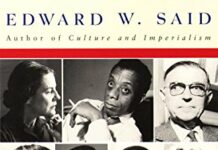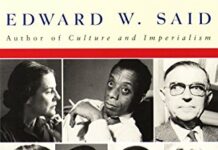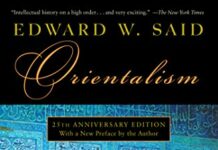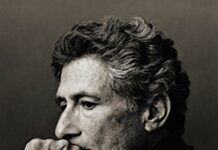
Ebook Info
- Published: 2002
- Number of pages: 656 pages
- Format: EPUB
- File Size: 0.74 MB
- Authors: Edward W. Said
Description
With their powerful blend of political and aesthetic concerns, Edward W. Said’s writings have transformed the field of literary studies. This long-awaited collection of literary and cultural essays, the first since Harvard University Press published The World, the Text, and the Critic in 1983, reconfirms what no one can doubt–that Said is the most impressive, consequential, and elegant critic of our time–and offers further evidence of how much the fully engaged critical mind can contribute to the reservoir of value, thought, and action essential to our lives and our culture.As in the title essay, the widely admired “Reflections on Exile,” the fact of his own exile and the fate of the Palestinians have given both form and the force of intimacy to the questions Said has pursued. Taken together, these essays–from the famous to those that will surprise even Said’s most assiduous followers–afford rare insight into the formation of a critic and the development of an intellectual vocation. Said’s topics are many and diverse, from the movie heroics of Tarzan to the machismo of Ernest Hemingway to the shades of difference that divide Alexandria and Cairo. He offers major reconsiderations of writers and artists such as George Orwell, Giambattista Vico, Georg Lukacs, R. P. Blackmur, E. M. Cioran, Naguib Mahfouz, Herman Melville, Joseph Conrad, Walter Lippman, Samuel Huntington, Antonio Gramsci, and Raymond Williams. Invigorating, edifying, acutely attentive to the vying pressures of personal and historical experience, his book is a source of immeasurable intellectual delight.
User’s Reviews
Editorial Reviews: Review “A compilation of 35 years’ worth of critical essays from one of the boldest and most articulate cultural theorists alive today. For those who know Said foremost as an outspoken and controversial advocate of Palestine, the breadth of intellectual curiosity and erudition manifest in these collected works will come as a pleasant surprise. Not until halfway through the anthology is there any mention of Palestine, and even in those essays that deal with his homeland, the author uses his unparalleled knowledge of the subject to illustrate larger points about anthropology, human rights, or nationalism…Said demonstrates that he is indeed a modern teacher and critic of the highest order…And yet, even the least political of his essays further his goal: to deprive us of our complacency by reminding us again and again that all knowledge is mediated by power, and no one is immune to its balance…Fascinating.”―Kirkus Reviews“Said views all of culture through the lens of ‘historical experience,’ emphasizing how feminism, ethnic and minority experience, and nationalism have broken tradition’s grip on literature…Given his keenly penetrating and original cast of mind, it is not surprising that Said’s personal pantheon of heroes includes those who blur the line between criticism and creation, among them Foucault, Nietzsche, Gramsci, Barthes, Adorno, and John Berger, not to mention pianist Glenn Gould, composer and conductor Pierre Boulez and filmmaker Gillo Pontecorvo…This wide-ranging and brilliant collection is a fitting tribute to one of our leading scholars, who has changed the way we look at Western culture.”―Publishers Weekly“For more than a third of a century, Columbia University professor Said has written insightfully about literature, culture, and the Middle East. This volume gathers nearly 50 essays, most on literary subjects, although Said also addresses philosophy and history, the arts and current events.”―Mary Carroll, Booklist“As these essays make clear, Said is engaged on a quest to connect what people want with the way they must live, even if that means discovering that the two ways are sometimes irreconcilable. His is a passionate strategy…[The essays are] little lamps that light up the great tangled forest of literature and philosophy.”―David Kirby, San Francisco Chronicle“The collection, much more than the sum of its parts, is the portrait of an exemplary intellectual life, in which rigor and clarity join with courage and commitment, and both with a rare kind of unswerving joy at the complex face of reality…This is surely a major work, among the most provocative and cogent accounts of culture and the humanities that America has produced in recent years. Said’s essays have a remarkable unity of position, given their temporal range. They contain no major swervings, no apologies–only a gradual maturing of his best insights, as they are applied to changing circumstances in politics and the academy…If there is a change in Said’s thinking, it is perhaps a subtle shift toward greater hopefulness.”―Martha C. Nussbaum, New York Times Book Review“Said’s work has been transformative…[Reflections on Exile is] indispensable for all college and university libraries.”―K. Tölölyan, Choice“Edward Said may be the world’s most famous English professor, and its most famous Palestinian after Yasir Arafat…Said turned 65 last year, having survived a life-threatening disease of the blood diagnosed nearly a decade ago. It is not surprising, therefore, that his recent publications have taken a retrospective turn…His latest book, Reflections on Exile–a monumental collection of essays spanning his 35 year career at Columbia University–is another result of his effort to impose thematic unity on his wide-ranging intellectual life.”―Mark Walhout, Books & Culture“These essays…form a remarkably cohesive whole and attest to the rigor and passionate seriousness of a lifetime of scholarship.”―Kate Blakinger, Boston Review“Said’s agile mind and learned voice are irreplaceable: no one combined his background and activism as a Palestinian with his magisterial criticism of literature, music, culture, and politics throughout a world increasingly divided into fundamentalist camps He was fully engaged with every part of the world, a goal of every educated person, and one that I wish for everyone’s summer reading.”―Henry St. Maurice, Phi Delta Kappan“The collection will serve as an ideal primer in the evolution of a critical position that established [Said’s] international reputation–and gained him some fierce opponents–as a leading intellectual voice in the humanities One of the many pleasures of this volume lies in Said’s command of the personal essay This collection contains a variety of essays that equally display his aesthetic refinement, his comparative perspective, his interdisciplinary spirit, and his ideological conviction.”―Philip Mosley, Comparative Literature Studies About the Author Edward W. Said was University Professor at Columbia University.
Reviews from Amazon users which were colected at the time this book was published on the website:
⭐This order was managed decently.
⭐Excelent product and service
⭐Edward Said was a Christian Palestinian who was born in Jerusalem, educated in Cairo, and became a Professor of English at Columbia University, as well as the most articulate spokesperson for the Palestinian cause. I’ve read his most famous work, “Orientalism,” as well as an easier, philosophical companion, “Covering Islam.” “Orientalism,” the word, has now becomes incorporated in the English language, and one of the definitions Webster’s now recognizes, largely due to this work, is: “a viewpoint, as held by someone in the West, in which Asia or specifically, the Arabic Middle East is seen variously as exotic, mysterious, irrational, etc.: term used to impute a patronizing attitude.” Professor Said died in 2003, and this book is a form of “summing up” of his life, and his viewpoints, and covers a wildly eclectic range of subjects and interests. Consider that an essay on the greatest and most famous singer in the Arab world in the 20th Century, Umm Kalthoum, is followed by an essay entitled “Introduction to Moby-Dick.”There are 46 essays in total, and their diversity ensures that some will induce serious eye-glazing in the reader, and for me those usual involved the ones on literary criticism. For example, there is an essay comparing Conrad and Nietzsche that only true literary specialists could appreciate, maybe all 10 of them. (Said was an expert on Conrad.) Likewise the essay entitled “Sense and Sensibility” which starts with the literary criticism of E.D. Hirsch. On the other hand, numerous essays resonated. A “Standing Civil War” is on the English fabulist T. E. Lawrence, a prime conduit for Orientalist thought, and of whom Said says: “…Lawrence becomes narrator and actor slowly being destroyed by a sense of consuming deceit.” Said has a solid essay on George Orwell, and given Said’s outlook as expressed in “Orientalism,” he savages V. S. Naipaul. Consider: “To say that Naipaul resembles a scavenger, then, is to say that he now prefers to render the ruins and derelictions of postcolonial history without tenderness… he prefers to indict the guerrillas for their pretensions rather than indict the imperialism that drove them to insurrection…” Or, “Naipaul wouldn’t make a trip to Israel, for example, which is not to say that he wouldn’t find rabbinical laws governing daily behavior any less repressive than Khomeini’s. No, his audience knows Israel is OK, “Islam” not.” There is also a solid essay on the “Grey Eminence,” Walter Lippmann. One of the most moving essays is the one which gives its title to this collection, and are the thoughts of the author about his life as an exile from his place of birth, to “have been exiled by exiles” as he puts it.For me the most fascinating essay is “The Quest for Gillo Pontecorvo,” and it is an interview with the famous Italian director whose film, “The Battle of Algiers” was proclaimed by Said as one of the two greatest political movies ever made. And simply learning how the movie was made, in Algiers, so soon after the bitter war of liberation, was illuminating, and worth the price of the book alone. Since Said is a Palestinian it was only natural that he press Pontecorvo on directing another movie, this time on the Palestinian issue. Pontecorvo declined, stating reasons that were not very convincing.The last essay in the collection is entitled “The Clash of Definitions,” which is a serious and worthwhile critique of Huntington’s “A Clash of Civilizations.” Said makes the now familiar point concerning the transformation of American Indians from “savages” to “victims” in less than a generation, but reinforces it with references to Hertog’s “The Mirror of Herodotus,” which painstakingly shows how Herodotus constructed an image of a barbarian “Other,” in his case, of the Scythians. One of Said’s central conclusions is that: “…a great deal of what used to be thought of as settled fact, or tradition, is revealed to be a fabrication for mass consumption in the here and now.”Overall, a very worthwhile collection of essays, and an enduring 5-star legacy to his memory.
⭐It is easy to get off on the wrong foot with Said if you are distracted by ideology and feel yourself threatened. What one has to do is look beyond the politics for long enough to see Said for what he is, namely, an intellectual who has devoted his life to learning. This is terribly rare these days. Sontag held the spot light for years as America’s premier intellectual. Gore Vidal still has a role to play, Edmund Wilson and Lionel Trilling both deserve mention, as do others, but in the end we are talking about a handful of people who can seriously be compared to the likes of Jean-Paul Sartre. American academics may be intellectual but they are rarely if ever intellectuals. I am not certain why, but Said, an expert on music among other things, succeeded in creating this role for himself. These essays provide a great introduction into the breadth of his thought. Like all intellectuals, he has his moments of stupidity and can be blindingly prejudiced, but then again so could Edmund Wilson and Sartre himself. What becomes apparent with intellectuals is that all of life gets submitted to intellectual scrutiny. There is none of this, “That’s not my field” stuff. Everything, including Philly steak sandwiches, gets analyzed. The erudition is impressive, but then finally it is love that stands out, not learning. Said is a lover of life, and that, ladies and gentlemen, can’t be taught.
⭐I thoroughly enjoyed this collection. As someone who loves Said’s style of prose, I savored every sentence as he expressed his thoughts on everything from Tarzan and Conrad to imperialism and the responsibility of intellectuals. Reading these essays gives one a very unique glimpse into Said’s understanding of the world – far more than reading his books I think. I don’t mean to trivialize his books, but in this collection you have a number of very personal reflections on a variety of subjects, written by a tremendously deep thinker.
⭐Delighted with it
⭐All time classic arrived on time.
⭐Its Said so its a good book. However, it is NOT for the beginner. At about the 2nd or 3rd essay I was starting to get lost. I seriously struggeled with the vocabulary at times. For that reason, the book could be critiqued as being inaccessible at times, but, with patience its informative nevertheless.
⭐Utmost comprehensive work by most widely read critic of last few decades.. the lucidity of it will not let you fancy using a book mark ever! A must on the shelves of all those voracious readers with world wide social sensibility and cultural sensitivity..
⭐A comprehensive anthology of essays by many other authors .
Keywords
Free Download Reflections on Exile and Other Essays (Convergences: Inventories of the Present) in EPUB format
Reflections on Exile and Other Essays (Convergences: Inventories of the Present) EPUB Free Download
Download Reflections on Exile and Other Essays (Convergences: Inventories of the Present) 2002 EPUB Free
Reflections on Exile and Other Essays (Convergences: Inventories of the Present) 2002 EPUB Free Download
Download Reflections on Exile and Other Essays (Convergences: Inventories of the Present) EPUB
Free Download Ebook Reflections on Exile and Other Essays (Convergences: Inventories of the Present)



